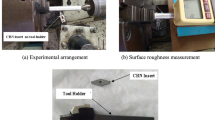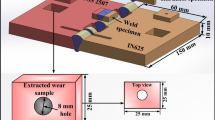Abstract
The last decade witnessed a rapid increase in the development of advanced materials for high-performance applications. While these materials solve a great deal of technological issues, they also pose considerable challenges in machining due to their poor machinability characteristics. During the machining of these materials, heat generation is more, which increases with a subsequent increase in the cutting speed. This heat generated, if not dissipated successfully, may affect the finished surface quality and reduce the tool life and hence overall performance of the process. Numerous tactics have been developed. Environmental friendly machining techniques, such as minimum quantity lubrication (MQL), have received significant attention to achieve precise profiling and enhanced surface integrity. Although molybdenum disulfide (MoS2) is frequently used as a solid lubricant because it promotes heat dissipation and reduces friction at the chip–tool interface, its potential as a valuable medium in MQL, particularly in surface integrity during turning operations, has not yet been investigated. The present study examines the effect of addition of MoS2 nanoparticles, in two different base fluids, namely water-soluble conventional oil and paraffin oil, during the turning of AISI 316L grade austenitic stainless steel (SS). The influence of cutting parameters such as cutting speed and feed has also been investigated on the machinability characteristics of the material. Significant reduction was obtained in cutting temperature along with a decrease in surface roughness, cutting force, formation of white layer thickness, tool wear and chip thickness when MoS2 powder was added to the base fluid. Results clearly exhibited the supremacy of MoS2 powder-mixed MQL. However, the study established MoS2 mixed conventional cutting fluid as a better coolant than MoS2 mixed paraffin oil. It is attributed to enhanced heat transfer characteristics of water-soluble conventional oil and the anti-frictional property of MoS2 nanoparticles.













Similar content being viewed by others
References
A. Thakur and S. Gangopadhyay, State-of-the-Art in Surface Integrity in Machining of Nickel-Based Superalloys, Int. J. Mach. Tools Manuf, 2016, 100, p 25–54.
M.A. Makhesana, M.P. Kaushik, M.K. Grzegorz, D. Mohd, A.K. Singla, and N. Khanna, Influence of MoS2 and Graphite-Reinforced Nanofluid-MQL on Surface Roughness, Tool Wear, Cutting Temperature and Microhardness in Machining of Inconel 625, CIRP J. Manuf. Sci. Technol., 2023, 41, p 225–238. https://doi.org/10.1016/j.cirpj.2022.12.015
A. Thakur and S. Gangopadhyay, Dry Machining of Nickel-Based Super Alloy as a Sustainable Alternative Using TiN/TiAlN Coated Tool, J. Clean. Prod., 2016, 129, p 256–268. https://doi.org/10.1016/j.jclepro.2016.04.074
K.M. Rajan, A.K. Sahoo, and R. Kumar, Investigation on Surface Roughness, Tool Wear and Cutting Power in MQL Turning of Bio-Medical Ti-6Al-4V ELI Alloy With Sustainability, Proc. Inst. Mech. Eng., Part E: J. Process Mech. Eng., 2022, 236(4), p 1452–1466. https://doi.org/10.1177/09544089211063712
M. Hadad and B. Sadeghi, Minimum Quantity Lubrication-MQL Turning of AISI 4140 Steel Alloy, J. Clean. Prod., 2013, 54, p 332–343. https://doi.org/10.1016/j.jclepro.2013.05.011
X. Yang, X. Cheng, and Y. Li, Machinability Investigation and Sustainability Analysis of Minimum Quantity Lubrication–Assisted Micro-Milling Process, Proc. Inst. Mech. Eng. Part B: J. Eng. Manuf., 2020, 234, p 1388–1401.
M. Bayat and M.M. Abootorabi, Comparison of Minimum Quantity Lubrication and Wet Milling Based on Energy Consumption Modelling, Proc. Inst. Mech. Eng. Part B: J. Eng. Manuf., 2021, 235, p 1665–1675. https://doi.org/10.1177/09544089211014407
A. Das, S.K. Patel, and M. Arakha, Processing of Hardened Steel by MQL Technique Using Nano Cutting Fluids, Mater. Manuf. Processes, 2021, 36(3), p 316–328. https://doi.org/10.1080/10426914.2020.1832688
E.A. Rahim and H. Sasahara, Investigation of Tool Wear and Surface Integrity on MQL Machining of Ti-6Al-4V Using Biodegradable Oil, Proc. Inst. Mech. Eng. Part B: J. Eng. Manuf., 2011, 225, p 1505–1511.
Z.Q. Liu, X.J. Cai, and M. Chen, An Investigation of Cutting Force and Temperature of End-Milling Ti-6Al-4V with Different Minimum Quantity Lubrication (MQL) Parameters, Proc. Inst. Mech. Eng. Part B: J. Eng. Manuf., 2011, 225(8), p 1273–1279.
X.J. Cai, Z.Q. Liu, and M. Chen, An Experimental Investigation on Effects of Minimum Quantity Lubrication Oil Supply Rate in High-Speed End Milling of Ti-6Al-4V, Proc. Inst. Mech. Eng. Part B: J. Eng. Manuf., 2012, 226(11), p 1784–1792.
S. Pradhan, S.R. Das, P.C. Jena, and D. Dhupal, Machining Performance Evaluation Under Recently Developed Sustainable HAJM Process of Zirconia Ceramic Using Hot SiC Abrasives: An Experimental and Simulation Approach, Proc. Inst. Mech. Eng. Part C: J. Mech. Eng. Sci., 2021 https://doi.org/10.1177/09544062211010199
S. Pradhan, D. Dhupal, S.R. Das, and P.C. Jena, Experimental Investigation and Optimization on Machined Surface of Si3N4 Ceramic Using Hot SiC Abrasive in HAJM, Mater. Today: Proc., 2021, 44, p 1877–1887. https://doi.org/10.1016/j.matpr.2020.12.066
Y. Touggui, A. Uysal, and U. Emiroglu, Evaluation of MQL Performances Using Various Nanofluids in Turning of AISI 304 Stainless Steel, Int. J. Adv. Manuf. Technol., 2021, 115(11), p 3983–3997. https://doi.org/10.1007/s00170-021-07448-x
L. Dash, S. Padhan, and A. Das, Machinability Investigation and Sustainability Assessment in Hard Turning of AISI D3 Steel With Coated Carbide Tool Under Nanofluid Minimum Quantity Lubrication-Cooling Condition, Proc. Inst. Mech. Eng. Part C, 2021 https://doi.org/10.1177/0954406221993844
N.R. Dhar, M.T. Ahmed, and S. Islam, An Experimental Investigation on Effect of Minimum Quantity Lubrication in Machining AISI 1040 Steel, Int. J. Mach. Tools Manuf, 2007, 47(5), p 748–753. https://doi.org/10.1016/j.ijmachtools.2006.09.017
R. Padmini, P.V. Krishna, and G.K.M. Rao, Effectiveness of Vegetable Oil Based Nanofluids as Potential Cutting Fluids in Turning AISI 1040 Steel, Tribol. Int., 2016, 94, p 490–501. https://doi.org/10.1016/j.triboint.2015.10.006
R.A. Raju, A. Andhare, and N.K. Sahu, Performance of Multi Walled Carbon Nano Tube Based Nanofluid in Turning Operation, Mater. Manuf. Processes, 2017, 32(13), p 1490–1496. https://doi.org/10.1080/10426914.2017.1279291
S. Pradhan, S.R. Das, P.C. Jena, and D. Dhupal, Investigations on Surface Integrity in Hard Turning of Functionally Graded Specimen under Nano Fluid Assisted Minimum Quantity Lubrication, Adv. Mater. Process. Technol., 2021, 8(sup3), p 1714–1729. https://doi.org/10.1080/2374068X.2021.1948706
M. Sayuti, A.A. Sarhan, and F. Salem, Novel Uses of SiO2 nano-Lubrication System in Hard Turning Process of Hardened Steel AISI4140 for Less Tool Wear, Surface Roughness And Oil Consumption, J. Clean. Prod., 2014, 67, p 265–276. https://doi.org/10.1016/j.jclepro.2013.12.052
A. Das, S.K. Patel, B.B. Biswal, N. Sahoo, and A. Pradhan, Performance Evaluation of Various Cutting Fluids Using MQL Technique in Hard Turning of AISI 4340 Alloy Steel, Measurement, 2020, 150, 107079.
N. Talib and E.A. Rahim, Performance of Modified Jatropha Oil in Combination with Hexagonal Boron Nitride Particles as a Bio-Based Lubricant for Green Machining, Tribol. Int., 2018, 118, p 89–104. https://doi.org/10.1016/j.triboint.2017.09.016
S. Padhan, A. Das, A. Santoshwar, T.R. Dharmendrabhai, and S.R. Das, Sustainability Assessment and Machinability Investigation of Austenitic Stainless Steel in Finish Turning with Advanced Ultra-Hard SiAlON Ceramic Tool under Different Cutting Environments, SILICON, 2020 https://doi.org/10.1007/s12633-020-00409-1
A. Das, S.R. Das, S.K. Patel, and B.B. Biswal, Effect of MQL and Nanofluid on the Machinability Aspects of Hardened Alloy Steel, Mach. Sci. Technol., 2019 https://doi.org/10.1080/10910344.2019.1669167
A. Das, N. Tirkey, S.K. Patel, S.R. Das, and B.B. Biswal, A Comparison of Machinability in Hard Turning of EN-24 Alloy Steel Under Mist Cooled and Dry Cutting Environments With a Coated Cermet Tool, J. Fail. Anal. Prev., 2019, 19(1), p 115–130.
T. Rajmohan, K.S.D. Sathish, and K. Palani kumar, Effect of a Nanoparticle-Filled Lubricant in Turning of AISI 316L Stainless Steel (SS), Particulate Sci. Technol., 2016, 35, p 201–208. https://doi.org/10.1080/02726351.2016.1146812
S. Roy and A. Ghosh, High-Speed Turning of AISI 4140 Steel by Multi-Layered TiN Top-Coated Insert With Minimum Quantity Lubrication Technology and Assessment of Near Tool-Tip Temperature Using Infrared Thermography, Proc.Inst. Mech. Eng, Part C, 2014, 228, p 058–1067.
S. Khandekar, M.R. Sankar, and V. Agnihotri, Nano-Cutting Fluid for Enhancement of Metal Cutting Performance, Mater. Manuf. Processes, 2012, 27(9), p 963–967. https://doi.org/10.1080/10426914.2011.610078
V. Krishna, P. Srikant, and R.D. Nageswara, Experimental Investigation on the Performance of Nanoboric Acid Suspensions in SAE-40 and Coconut Oil During Turning of AISI 1040 Steel, Int. J. Mach. Tools Manuf, 2010, 50, p 911–916. https://doi.org/10.1016/j.ijmachtools.2010.06.001
A. Yücel, C.V. Yıldırım, and M. Sarıkaya, Influence of MoS2 based Nanofluid-MQL on Tribological and Machining Characteristics in Turning of AA 2024 T3 Aluminum Alloy, J. Market. Res., 2021, 15, p 1688–1704. https://doi.org/10.1016/j.jmrt.2021.09.007
M.M. Molaie, J. Akbari, and M.R. Movahhedy, Ultrasonic Assisted Grinding Process With Minimum Quantity Lubrication Using Oil-Based Nanofluids, J. Clean. Prod., 2016, 129, p 212–222. https://doi.org/10.1016/j.jclepro.2016.04.080
A. Thakur, S. Gangopadhyay, and K.P. Maity, Evaluation on Effectiveness of CVD and PVD Coated Tools During Dry Machining of Incoloy 825, Tribol. Trans., 2016, 59(6), p 1048–1058. https://doi.org/10.1080/10402004.2015.1131350
S. Padhan, N.K. Wagri, L. Dash, A. Das, S.R. Das, M. Rafighi, and P. Sharma, Investigation on Surface Integrity in Hard Turning of AISI 4140 Steel with SPPP-AlTiSiN Coated Carbide Insert under Nano-MQL, Lubricants, 2023, 11(2), p 49. https://doi.org/10.3390/lubricants11020049
Author information
Authors and Affiliations
Corresponding author
Additional information
Publisher's Note
Springer Nature remains neutral with regard to jurisdictional claims in published maps and institutional affiliations.
Rights and permissions
Springer Nature or its licensor (e.g. a society or other partner) holds exclusive rights to this article under a publishing agreement with the author(s) or other rightsholder(s); author self-archiving of the accepted manuscript version of this article is solely governed by the terms of such publishing agreement and applicable law.
About this article
Cite this article
Singh, A., Thakur, A. & Gangopadhyay, S. Influence of MoS2-Based Nanofluid Minimum Quantity Lubrication on Machining Performance of AISI 316L Stainless Steel. J. of Materi Eng and Perform (2024). https://doi.org/10.1007/s11665-024-09454-y
Received:
Revised:
Accepted:
Published:
DOI: https://doi.org/10.1007/s11665-024-09454-y




